
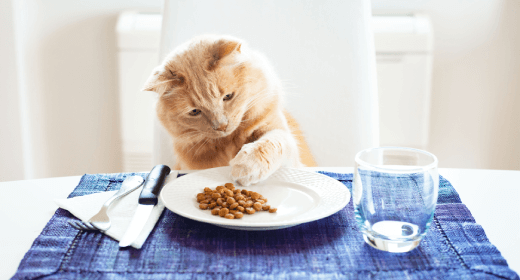
Compared to humans, your cat needs a high-fat, high-protein diet along with other important nutrients. Cats usually eat many small meals throughout the day, so they easily adopt a free choice feeding schedule to maintain their normal body weight. Dry foods, such as IAMS™ PROACTIVE HEALTH™ Healthy Adult with Chicken, are best suited for free choice feeding because they stay fresh for a longer period.
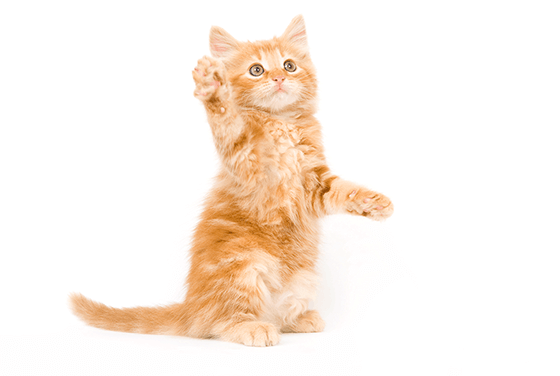
Here are few tips on how to feed a cat:
Wondering what do cats eat ? Cats need nutrients from animal-based protein sources. Providing the vitamins, minerals, proteins, and other components found in a portion of complete and balanced pet food can help your cat live a long and healthy life. It is important to avoid supplementing your cat's diet, as doing so may lead to a variety of health problems.
When selecting cat food, refer to a cat nutrition chart that offers the following nutrients:
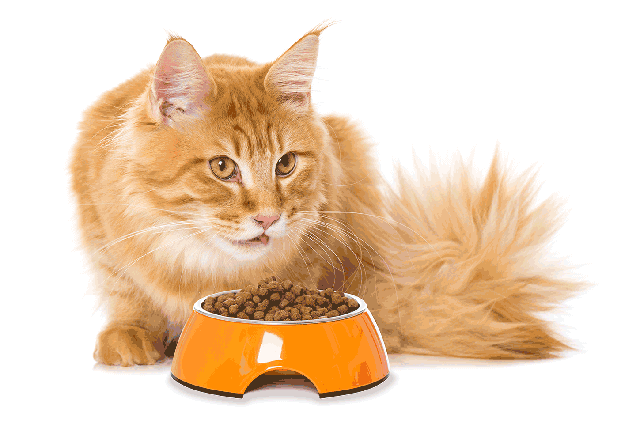

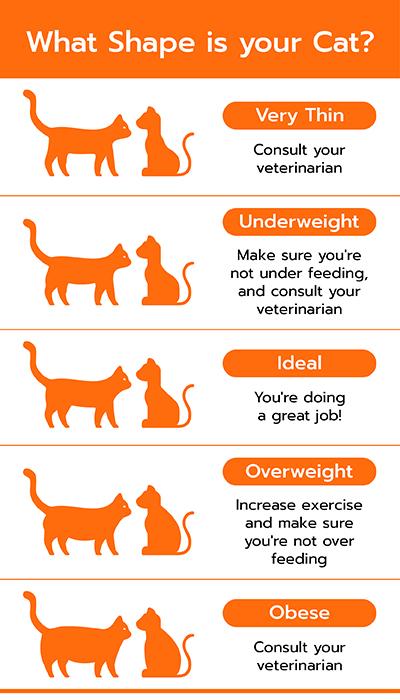
Same time, we recommend you control the amount of food you feed your cat. Even if it is a weight loss-based cat food, the quantity should be checked properly.
The amount to feed your cat depends on its age, size, and activity level. Feeding guidelines that recommend the daily amount of food you may feed your cat are included on all IAMS packages. Start feeding your cat the mentioned amount and adjust according to its needs. Remember to divide the portion accordingly if you feed more than once a day. With that said now, take a look at this chart on how much to feed a cat:
| Weight of cat (kg) | G/day |
|---|---|
| 3 | 45 |
| 4 | 55 |
| 5 | 60 |
| 6 | 70 |
| 7 | 80 |
| 8 | 90 |
IAMS offers a high protein diet food for cats that are either underweight or overweight. The IAMS Indoor Weight and Hairball Care food is made with a formula that is suitable for cats who are either in need of increasing weight or decreasing it. The benefits of this cat diet plan are as follows:
There is no problem if your cat prefers to eat alone, as long as it finishes what you have put on its plate.
One of the reasons your cat is hungry all the time could be that it is not being fed the right food. Diseases like diabetes and hyperthyroidism can also make your cat feel hungry all the time. If you notice unusual symptoms in your cat, it is advisable to get it checked by a vet.
If your cat refuses to eat, it might not just be because it is a finicky eater. It may also be experiencing health issues like kidney failure or infection in its intestines. Another reason for your cat rejecting food maybe furballs. Furballs are foreign obstacles that get stuck in the cat’s digestive tract, making it hard for your cat to eat food. So, if you notice your cat not eating food, it is advisable to consult the vet immediately.
If you have ruled out health issues with the vet, then here are some tips on how to feed a cat:
Here’s how you can know if your cat is hungry:
It may also steal food to satiate its hunger at odd times.
If you feel that your cat is acting hungry even after feeding it the right amount daily food, it might be a greedy eater.
Here are some tips to recognize a hungry cat:

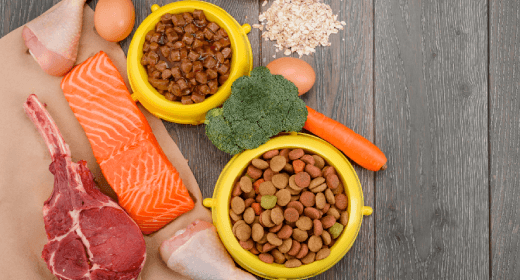
Good nutrition is key to a long and healthy life for all living beings. That being said, cats need a balanced diet to be able to grow, maintain their body, stay active, and fight any illnesses or recover from them. As a pet parent, you must be aware of the right ingredients to include in your cat’s diet.
Cats are carnivores and they need nutrients that are found only in animal products. Cats were originally hunters and would feed on their prey to derive high amounts of protein, moderate amounts of fats, and some carbohydrates to maintain a nutritional diet. Today, most cats that are domesticated do not need to hunt but still require their food to contain the right proportions of nutrients to be able to live a healthy life. Apart from that, cats also need nutrients such as minerals, vitamins, fatty acids, and amino acids.
The best diet for cats will contain all the essential nutrients in the right proportions. A variety of ingredients can help you provide the right energy sources for your cat. For example, a nutrient like calcium can be derived from ingredients like dairy products, organ tissues, bones, bone meals, meat, legume plants, and through mineral supplements. Devising a cat diet plan is all about making sure your kitty gets the right amount of proteins, fats, carbohydrates, vitamins, minerals, and water. Keep reading to learn more about how different nutrients play a part in your cat’s well-being.
As carnivores, cats need to eat a lot more protein as compared to many other animals. Protein is also the primary source of energy in cats as it helps them maintain skin, hair, muscle, fur, tendons, ligaments, cartilage, enzymes, antibodies, hormones, and more. Cats use protein for energy and for maintaining their blood glucose levels. Its liver enzymes are continuously breaking down proteins to do so. If cats do not consume enough protein, their bodies will start breaking down their own muscles to fulfill their energy requirements.
The two main sources of protein used in cat food are plant protein and animal protein. If you are a vegetarian and a vegetarian diet appeals to you for your cat, keep in mind that this may not be the best decision for your feline’s well-being because it will not be able to meet its nutritional requirements through plant protein sources alone. Certain nutrients are only present in animal protein such as taurine, methionine, and cystine.
Animal protein in cat food is derived from chicken, turkey, lamb, beef, and fish. Different meat meals and meat by-products are also available in the market today. While many pet parents may think that these meals are not a good option, they actually act as a great source of concentrated protein.
The right amount of protein for cats depends on their age. Adult cats need a high percentage of protein as compared to dogs, humans, or many other animals. While the exact proportions may vary, adult cats need around 26% protein in their meals. Protein requirements for kittens may change according to their medical history and age. It is best to consult a veterinarian to make sure your kitten receives the right nutrition.
Vitamins are essential for your cat’s metabolic function and therefore must be included in small amounts in its diet. Many enzymes that help maintain normal feline metabolism cannot function without vitamins.
Several cat food ingredients such as fruits, vegetables, animal tissues, vegetable oils, grains, and seeds contain vitamins. It is very difficult to nail down the right amount of vitamins that your cat needs through just different foods. For this reason, vitamin supplements should be included in your cat’s diet.
If your cat is healthy and is eating a balanced and nutritious meal, additional vitamin supplements may not be necessary. In some cases, vitamin supplements can also be dangerous if your cat is already healthy and does not require them. It is best to consult a veterinarian and be sure of your cat’s health and its requirements.
Your cat’s body needs inorganic compounds, also known as minerals, to function properly. Many minerals that your cat needs are derived from animals and plant-based ingredients. However, for your cat’s food to be completely balanced, food manufacturers always add mineral protein to their food formulas.
There are a lot of minerals that should be present in your cat’s diet such as calcium, phosphorus, potassium, magnesium, iron, sodium, chloride, copper, zinc, manganese, iodine, and selenium. These minerals help cats maintain nerve, muscle, and heart function. They also aid in enzyme function, supplying oxygen throughout the body, skeletal growth, and much more. Your cat’s food formula will always contain some minerals. If you want to be sure about your kitten getting the right nutrition, take it to the vet and let them decide the perfect cat diet plan for your furry friend.
Crude fat is estimated by extracting fats that are present using ether and the crude fat level of every cat food formula will be listed in the guaranteed analysis section on the packaging label.
Including fats in your cat's diet is extremely important. While proteins are an important energy source for cats, fat is the most energy-rich nutrient in your cat's diet. They act as transport molecules that help carry out nerve impulses. Essential fat sources such as omega-3 fatty acids and omega-6 fatty acids help maintain your cat's skin, coat, and fur health.
Fats and other essential fatty acids are found in food formulas that contain liver, chicken, beef, turkey, and fish. At times, manufacturers add extra fat to their formula. You can ascertain the same by checking the fat sources on the ingredient list label. Fish oil, beef fat, and soybean oil are examples of added fat.
Keeping cat food weight management is extremely important when it comes to fats. Cats need to maintain a certain body type to stay active. Hence, a diet with high levels of fats is not recommended. Your feline friend should not be consuming more fat than it requires on a daily basis. Doing so will lead to your cat putting on weight and inviting health troubles. Talk to your veterinarian to know the ideal fat content for your cat’s diet.
Many animals need carbohydrates to obtain energy. However, since cats derive most of their energy from proteins and fats, carbohydrates are not that important in their diet. No, this does not mean that you can completely stop including carbs in your cat’s diet. Small amounts of carbohydrates are ideal for your cat to derive some energy. A diet that contains high levels of carbs is not recommended for cats at all since it may aid in putting on weight and will attract serious diseases such as diabetes.
Your cat’s diet should not include more than 10% of carbohydrates. Dry diets may have high amounts of carbohydrates. The only way to ensure that your cat is not eating too much carbs is by including wet food in its diet.
The best diet for cats includes the right balance of all nutrients. A perfect balance of proteins, fats, carbohydrates, vitamins, minerals, and water will help your cat to grow healthy and maintain its ideal body weight. If you are concerned about your cat’s diet and need more insights on what to feed your cat in what proportions, simply reach out to your local veterinarian.